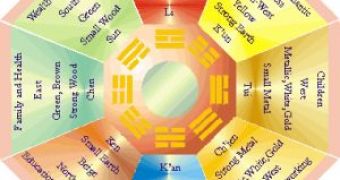Translated literally as "wind and water", Feng Shui represents the Chinese art of positioning objects in buildings and other places based on the belief in positive and negative effects of the patterns of yin and yang and the flow of chi, the vital force or energy inherent in all things. The goal of Feng Shui is to achieve harmony, comfort, and balance, first in one's environment and then in one's life.
Feng Shui was originally used to choose burial sites for the wealthy and palace locations for royalty. Men of that time studied the signs the earth left behind (a science known as geomancy), such as wind-worn trees, sharp protruding rocks or soft meandering streams.
Feng-shui is based on the Taoist vision and experience of nature, in particular the idea that the land is alive and filled with energy. Taoism classifies natural features as yin (shadow, female) or yang (light, male). Water is yin, and mountains are yang. Earth is yin, and sky is yang. When water meets mountains or clouds drop from the sky to embrace the earth, nourishing energy is generated. Mountains that seem to disappear and reappear because of shifting clouds are said to contain tremendous energy.
Chi, a Chinese word that has no direct translation in other languages, holds several meanings at once: cosmic energy, life force, breath, and vapor. Chi is the invisible energy that animates all living things. Chi flows continuously: through pathways (or meridians) in your body (the practices of acupuncture and Asian medicine are based on these flows); through your home, through the Earth, the heavens, the atmosphere, and the cosmos.
Another basic principle for Feng Shui is the one based on the Five Elements: wood, fire, water, earth and metal. Each of this primordial elements is related to a color: green is for wood, red for fire, black or blue for water, brown or yellow for earth and white, gold or silver for metal.
Wood represents the East direction and spring season, Fire South and summer, Earth stands for the Center, Metal for West and autumn and Water for North and winter.
Metal energy is clean, simple and detail-oriented. Earth is lush, nurturing and comfortable. Water is free-flowing, expressive and intuitive. Wood is ambitious, forward-thinking and practical. Fire is passionate, excitable and changeable. Each of us has a unique combination of these five energies in our own personality, usually with one predominant element.
The Five Elements are continuously interfering and form a productive cycle and a destructive cycle. In the productive cycle, Fire produces Earth, which produces Metal which produces Water which produces Wood which produces Fire. In the destructive cycle, Wood destroys Earth, which destroys Water, which destroys Fire, which destroys Metal, which destroys Wood.
This can be used for a person to incorporate his or her astrological element so as to be in harmony and productive with the surrounding. For example, if somebody is born in a fire year, too much water (like black colored things, ponds, artificial waterfalls) in the home would not be beneficial as Water destroys Fire. On the other hand, lots of plants or green things (Wood) and even a wooden house would be very auspicious because Wood produces Fire. Additionally, it would be beneficial if one slept in the room located on the south side of the house or apartment.
Wood stands for family and stability, Fire for fame and reputation, Earth for Health, Metal for creativity and children and Water for career.
Nevertheless, the most important rule in Feng Shui is to keep a balance of these five elements when decorating a building, with one predominant over the others depending on the decorated area. For example, in the working area of your house or in your office you should use more water and metal, but don't forget to include all the others.

 14 DAY TRIAL //
14 DAY TRIAL // 
